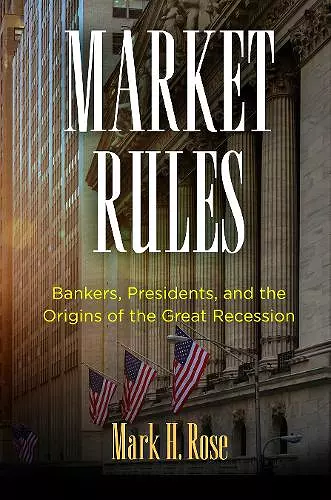Market Rules
Bankers, Presidents, and the Origins of the Great Recession
Format:Hardback
Publisher:University of Pennsylvania Press
Published:28th Dec '18
Currently unavailable, and unfortunately no date known when it will be back

This book delves into how political and regulatory influences shaped the financial industry, culminating in the events leading to the 2008 crisis. Market Rules provides a detailed historical analysis.
In Market Rules, Mark H. Rose explores the intricate relationship between political forces and the evolution of the financial industry in the United States. While many attribute changes in finance to market dynamics, Rose argues that presidents, legislators, regulators, and bankers have played pivotal roles in shaping the landscape. The narrative begins with Richard Nixon's Commission on Financial Structure and Regulation in 1971, which envisioned banks as 'supermarkets'—one-stop shops for a range of financial services, from deposits to insurance and investments. This concept marked a significant shift from traditional banking models and laid the groundwork for the complex financial institutions we see today.
The book details the rise of supermarket banks over four decades, highlighting how the banking industry consolidated and transformed into a structure that was both expansive and challenging to regulate. As these banks grew, they became increasingly intertwined with the economy, leading to a scenario where, by 2008, institutions like Citigroup required federal intervention for stability. Rose skillfully weaves together the stories of influential figures, from well-known presidents to lesser-known regulators, illustrating how their decisions shaped financial policy and practices.
Market Rules is not just a history lesson; it is an insightful analysis of how financial policy has evolved and the consequences of those changes. By demystifying the complexities of the banking industry, Rose provides readers with a clearer understanding of the forces that led to the 2008 financial crisis and the ongoing implications for regulation and policy today.
"Rose utilizes a sure grasp of regulatory issues, a command of interdisciplinary literature, the fruits of deep archival research, and the ability to craft political narratives and biographical sketches. Market Rules is, without doubt, the best book we have on the history of the regulation of commercial banking from the 1960s to 1999." * The Journal of American History *
"Mark Rose has written a lively and lucid account of banking and financial history over the past half century, laying out the grand ambitions and rivalries of leading bankers and policymakers like Walter Wriston, Donald T. Regan, and Sandy Weill-and the changing strategies for delivering economic growth led by presidents Kennedy, Reagan, and Obama. Market Rules relates the history of today's massive multipurpose banks, the 2008 crisis, and its aftermath to broader trends in American society and life from the 1960s to the present. It is a great achievement." * Walter Friedman, Harvard Business School *
"Compared to half a century ago, America has many fewer and much larger banks. Mark Rose's engaging study shows that this was far from a market outcome. It was a product of bank politics: entrepreneurial bankers persuaded U.S. presidents and regulators that ever-larger, less regulated 'supermarket' banks were more efficient, more stable, and thus more growth-promoting. The actual outcome-financial crisis, the Great Recession, and slower growth-lead Rose to suggest that, in banking, political clout trumped economic efficiency." * Richard Sylla, New York University *
"Mark Rose's engaging study follows a group of men, who, over successive presidential administrations, helped transform the landscape of American banking in the late twentieth century. Rose makes a compelling argument that the history of American banking is a fundamentally political one. In its focus on politics and people at the center of banking, Market Rules offers a unique voice." * Susie Pak, St. John's University *
- Short-listed for Finalist for the 2020 Hagley Prize in Business History from the Business History Conference 2021
ISBN: 9780812251029
Dimensions: unknown
Weight: unknown
272 pages